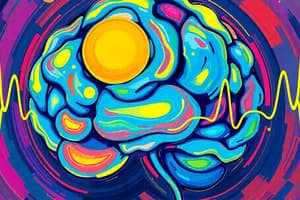Podcast
Questions and Answers
What is a common consequence of not getting enough sleep?
What is a common consequence of not getting enough sleep?
- Enhanced emotional stability
- Improved cognitive function
- Increased energy levels
- Accidents such as the Exxon Valdez disaster (correct)
Which sleep disorder is characterized by sudden, uncontrollable sleep attacks?
Which sleep disorder is characterized by sudden, uncontrollable sleep attacks?
- Insomnia
- Narcolepsy (correct)
- Limb Movement Disorders
- Circadian Rhythm Disorders
What does EEG measure in relation to sleep?
What does EEG measure in relation to sleep?
- Heart rate variability
- Body temperature changes
- Respiratory rate
- Neuronal activity through electrical signals (correct)
What behavioral characteristic is NOT associated with sleep?
What behavioral characteristic is NOT associated with sleep?
How can you determine if someone is in a state of sleep?
How can you determine if someone is in a state of sleep?
Which disorder involves unusual behaviors during sleep such as sleepwalking?
Which disorder involves unusual behaviors during sleep such as sleepwalking?
What impact does sleep deprivation have on the EEG?
What impact does sleep deprivation have on the EEG?
Which of the following is NOT listed as a benefit of healthy sleep?
Which of the following is NOT listed as a benefit of healthy sleep?
What is an essential feature of the behavioral definition of sleep?
What is an essential feature of the behavioral definition of sleep?
What is one of the signs of insufficient sleep?
What is one of the signs of insufficient sleep?
According to the content, how many hours of sleep is generally recommended to feel at your best?
According to the content, how many hours of sleep is generally recommended to feel at your best?
Which factor is mentioned that may impact sleep patterns in different age groups?
Which factor is mentioned that may impact sleep patterns in different age groups?
What strategy is proposed for improving sleep quality?
What strategy is proposed for improving sleep quality?
Among the listed activities, which one is most inhibited by lack of sleep?
Among the listed activities, which one is most inhibited by lack of sleep?
Which of the following statements reflects a common misconception about sleep?
Which of the following statements reflects a common misconception about sleep?
What aspect of sleep is NOT mentioned as a reason why it might 'robb' years from our lives?
What aspect of sleep is NOT mentioned as a reason why it might 'robb' years from our lives?
Flashcards are hidden until you start studying
Study Notes
Defining Sleep
- Sleep is a reversible state of perceptual disengagement from, and unresponsiveness to, the environment.
- Sleep is characterized by typical behavioral concomitants (e.g., recumbent, closed eyes)
- Sleep is observable and reversible.
- Sleep is a complex process, critical for physical and mental health.
Measuring Sleep
- Polysomnography is a comprehensive sleep study used to diagnose sleep disorders.
- Polysomnography measures brain activity (EEG), eye movements (EOG), and muscle activity (EMG).
- Actigraphy is a non-invasive method that measures movement to assess sleep duration and timing.
- Sleep surveys and questionnaires are used to collect subjective information about sleep habits and quality.
Why We Sleep
- Sleep is essential for cognitive function, memory consolidation, and emotional regulation.
- Sleep deprivation can lead to impaired alertness, attention, and decision-making.
- Insufficient sleep can also increase the risk of chronic diseases such as cardiovascular disease, diabetes, and obesity.
Sleep Disorders
- Insomnia is the most common sleep disorder, characterized by difficulty falling asleep or staying asleep.
- Circadian rhythm disorders involve problems with the body's natural sleep-wake cycle.
- Parasomnias are sleep disorders that involve abnormal behaviors or experiences during sleep.
- Limb movement disorders such as restless leg syndrome (RLS) are characterized by involuntary movements of the legs.
Sleep Metrics - Neurophysiological
- Electroencephalogram (EEG) is a neurophysiological measure that records electrical activity in the brain.
- EEG amplitudes reflect neuronal synchrony.
- Higher amplitude EEG signals occur during sleep when neurons are more synchronized.
Studying That Suits You
Use AI to generate personalized quizzes and flashcards to suit your learning preferences.




